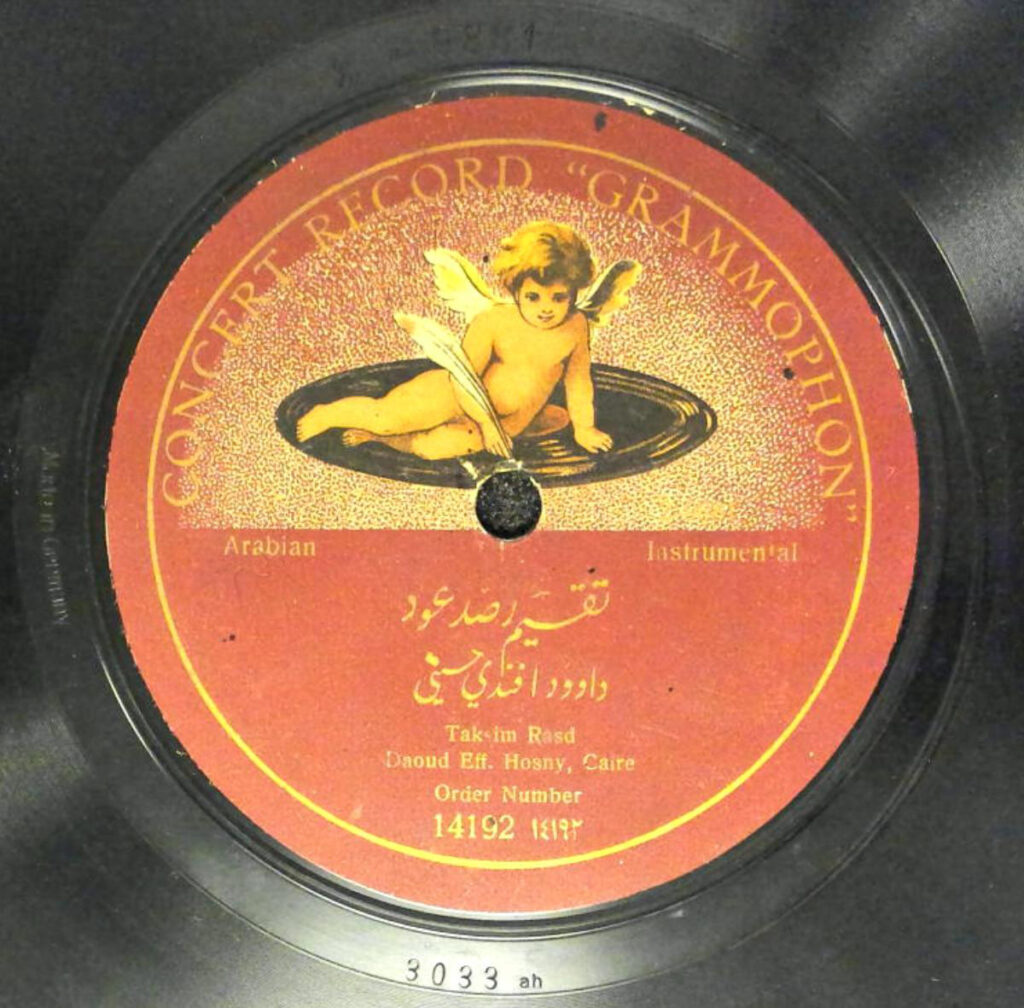
Public Domain Day is not just about the famous works that get released—-this year Milne’s Winnie-the-Pooh and Hemingway’s The Sun Also Rises were the best known-—but the archives that suddenly open up when any potential argument over copyright bypasses its sell-by date.
For example, Harvard’s Loeb Music Library has just released a selection from its 600-volume 78rpm collection of Arab and Arab-American music from the early 20th Century. The Library’s collection spans roughly 1903 to the 1950s and is not just a record of the aesthetics and the time of the Nahdah Era (the Arab Renaissance), but it also serves as a history of the still-young music industry. Among the RCA, Columbia, and Victor labels, you will also find many independent (and bootleg!) labels.
Harvard’s website notes:
Arab record companies, such as Baidaphon and Cairophon, are only a few among many other American (Columbia, Victor), European (Odeon, Orfeon), and Arab-American companies (Al-Chark, Alamphon) that recorded and released these notable Arab voices. Songs and performers from Egypt, Syria, Lebanon, Palestine, Iraq and Al-Maghrib exhibit the rich tradition of Arabic musical forms, namely the art of al-mawwāl (vocal improvisation), qaṣīdah (sung poems), muwashshaḥ (Andalusian sung poetry), ṭaqṭūqah (pop songs) and taqsīm (instrumental improvisation. Religious chants are also an important piece of the Arabic musical tradition. The collection includes Qur’anic recitation of Al-shaykh Ṭāhā Al-Fashnī and a rare record of a woman reciter Wadūdah Al-Minyalawī alongside Christian hymns of Father Gigis ʻAzīz Al-Jizzīnī.
A selection of recordings are available here for both online listening and download, using the Aviary Platform.
All this is happening due to the Music Modernization Act of 2018, which differs in its public-domain release dates by a few years compared to print and film. According to Citizen DJ, a website we told you about several years ago, “all sound recordings published before January 1, 1923 entered the public domain on January 1, 2022.”
The trick of course is getting access to all of these recordings. The Library of Congress runs a site called The National Jukebox, with access to thousands of 78rpm records from Victor and Columbia labels. That allows you to listen but not download.
The Association for Recorded Sound Collections also has a page noting “Ten Notable Pre-1923 Recordings”, which benefits from its curation. It features important early works like Mamie Smith’s “Crazy Blues,” one of the most popular “race records” (i.e. vocal blues sung by Black performers) of 1920; Enrico Caruso’s “Vesti La Giubba,” which features the tenor at the height of his career; and Vess L. Ossman’s recording of Joplin’s “Maple Leaf Rag,” which helped popularize the composer. Also see our recent post: 400,000+ Sound Recordings Made Before 1923 Have Entered the Public Domain.
Related Content:
The Great Gatsby Is Now in the Public Domain and There’s a New Graphic Novel
Ted Mills is a freelance writer on the arts who currently hosts the Notes from the Shed podcast and is the producer of KCRW’s Curious Coast. You can also follow him on Twitter at @tedmills, and/or watch his films here.


If you would be so kind as to examine my website http://www.johndeacon.biz you will establish the modest part I played, over several decades, in the manufacture and distribution of nearly all the major Arab record labels from the factory of EMI Greece (formerly The Columbia Graphophone Co. of Greece) where I was Sales Director (1971–77). That factory and 4‑studio facility was founded c.1926 (with eventually a total 380 employees) and where the manufacture of LPs, musicassettes & 8‑track cartridges for the Arab world (excluding the Maghreb which was largely run by the Club du Disque Arabe (CDA) out of Paris — where its late owner Mr.Ahmed Hachlef had been in charge of Arab musics at Pathé Marconi — later EMI Pathé Marconi and then just EMI France). Your website, covering this subject, has just been brought to my attention and I have circulated details of it to numerous figures in the field (and even in some cases to their descendants) and I hope I am awaiting that an interesting dialogue — notably on the subject of copyright protection lasting 100 years ! There very are few in the world who will agree with that one !!
At my website — and apart from biographical details — is a separate article on the misappropriation of the HMV Alexandria 1926 recordings of Oum Koulsoum by the Nasser government. This was prepared with assistance from EMI’s former Chief Counsel Guy Marriott and Dr. Michael Frishkopf of Alberta University.
John G. Deacon
http://www.johndeacon.biz
Sales Director, EMI Greece (1971–11) & founder of Conifer Records (UK)
Tel. +44 7375 846242